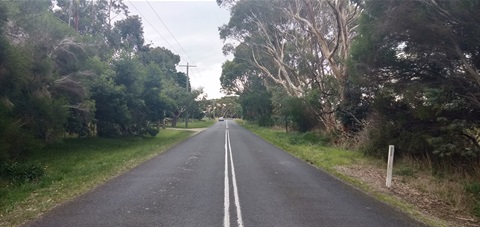
Council has adopted a four-year plan outlining the standards it will use to manage and maintain its network of roads and footpaths.
There are around 608km of Council-managed sealed roads and 470km of unsealed roads in the Surf Coast Shire, with 30 per cent of these also featuring footpaths and kerb and channel.
The Road Management Plan 2025-29(PDF, 4MB) features a classification and hierarchy of roads, streets and footpaths, and sets out:
- How often each type of road, street and footpath will be inspected;
- The level of defect required for intervention or repair (for example, the criteria for repair of a pothole on a sealed road is greater than 50mm depth with a diameter of more than 300mm); and
- The repair timeframes Council commits itself to achieving.
The levels of service take into account safety, community expectations and technical standards, as well as the financial capacity of the Council.
Following an extensive review of the previous plan that considered historical data, current resourcing, benchmarking with other Councils and the results of last year's unsealed road maintenance review, the new plan features several changes, including:
- Improved inspection and response times for roads the community uses most frequently;
- Responding to increased community requests by increasing proactive inspection routines and ensuring regular asset checks; and
- Including inspections of previously excluded roads.
A draft of the plan was open for community feedback between 25 June and 1 August this year.
Councillor Joel Grist said road and footpath maintenance was a fundamental Council role, making the Road Management Plan one of its key documents.
"The community rightfully has high expectations when it comes to road maintenance, which we aim to meet," Cr Grist said.
"Equally, we have to take into account that there are constraints on our finances and resourcing, and that we have a large road network to cover.
"The plan achieves a strong balance between those factors and places higher emphasis on more regular inspection and faster repair of defects on our most frequently used roads."
All Victorian councils are required to adopt a new road management plan within one year after a council election.
Road Management: Fast Facts
During the 2024-25 financial year, Council's Civil Operations team:
- Responded to 3,318 requests from the community regarding roads and drainage
- Proactively inspected 8,766 segments of roads
- Completed 4,454 maintenance jobs identified from these proactive inspections and customer requests
Jobs completed included:
- Grading of unsealed roads
- Patching potholes in sealed roads
- Unblocking drains
- Repairing damaged and vandalised signs
- Removal of dead animals and illegally dumped rubbish from roadsides






